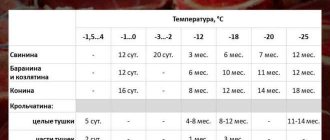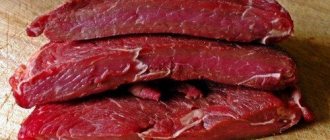Meat is considered a perishable product on which bacterial flora develops quite quickly. The best way to prolong its storage is to place it in the freezer. But it must be remembered that over time the quality deteriorates, the element of the diet loses its mass. The most valuable part - muscle fibers at low temperatures begin to dehydrate and are destroyed, as well as some of the vitamins included in its composition. That's why it's so important to know how long meat lasts in the freezer.
Let's find out!
Choosing meat to freeze
To ensure that the meat lasts in the freezer for as long as possible, pay utmost attention to the choice of product.
Distinctive characteristics of a quality product:
- the color of the cut will always correspond to the type of meat and have an even shade;
- the smell of the product will be light and non-acidic;
- its structure will be elastic and dense, it will spring well when pressed with a finger;
- the fat layer should be white, not yellow.
If you take into account all the listed criteria when purchasing, the meat will retain its freshness and quality in the freezer for a long time.
Determining the delay
Anyone can identify expired products if they know what to pay attention to:
- Smell. The presence of a sharp, unpleasant, sour, musty odor indicates spoilage.
- Color. Fresh, fresh meat, depending on the variety, has a shade from light pink to bright red and even brown. If you see a piece of greenish color with the presence of a white coating and suspicion of mold, refuse to use it.
- Elasticity. When pressed, a high-quality, unspoiled product quickly returns to its original shape. If the fillet darkens, is loose, with a slimy coating, this indicates its unsuitability for food.
- When purchasing, always pay attention to the integrity of the packaging and expiration dates indicated by the manufacturer. Remember that spoiled product is often used to marinate kebab or produce finished products for the culinary department.
- When purchasing a product on the market, be sure to check for a sanitary inspection stamp.
Storage rules
To prevent meat from losing freshness and quality in the freezer, make sure it is properly cut and prepared.
Preparing for freezing
Before you put your piece in the freezer, prepare it. Determine in advance what you will cook from the carcass and divide it into appropriate portions. This will allow you not to defrost the entire piece if only part of it is required for the dish, since repeated freezing will lead to a loss of product quality.
Should I wash meat before freezing or after defrosting?
Do not wash meat under any circumstances. This leads to loss of quality and faster spoilage, since the liquid penetrates the fibers and expands when frozen, which leads to a breakdown in the structure of the fillet. If you want the product to last a long time, grease each piece with sunflower oil.
How to properly freeze a product?
Do not keep meat in the chamber without packaging, otherwise the fibers will darken and lose some of their beneficial properties. It's best to wrap each piece in cling film or a plastic freezer bag. Place different varieties only in different bags. Try to ensure that the packaging does not come into contact with other products in the chamber, since their bacteria can penetrate into the meat even through polyethylene.
For convenience, label each package indicating the date of freezing and the type of product.
At what temperature should you store meat in the freezer?
Most freezers are equipped with a temperature controller. Here you can set the temperature from 0 to -24 degrees. The temperature at which the meat will lie without losing quality depends on the shelf life. For example:
- in a chamber with a temperature of 0 to -6 degrees, the meat will lie for 2–3 days; if it is not a fillet, but a piece on the bone, the period will be reduced to 24–48 hours;
- at temperatures from -6 to -12 degrees, fillets, whole carcass or portioned pieces will maintain quality for 4 months;
- the product will not lose taste and quality for six months if it is kept in the freezer at a temperature of -18 degrees;
- at temperatures from -18 to -24 degrees, a fillet or piece on the bone will last for at least 18 months, but its structure may change during long-term storage.
Can meat spoil in the freezer?
Of course, meat cannot sit in the freezer for too long. Over time, its mass decreases, and the fibers lose useful molecular compounds. The fact is that freezing does not stop the development of biochemical reactions, but only slows them down. In addition, structural changes in some protein enzymes do not slow down even at very low temperatures, and lipid compounds change composition over a long time.
In addition, the liquid remaining in the fibers oxidizes and triggers new reactions that cause irreversible changes in the molecular structure of the product.
Remember that even frozen foods deteriorate over a long period of time, so do not risk eating meat that has been in the chamber longer than expected.
How to choose fresh
Choosing fresh meat without experience is difficult. Skilled traders perform many manipulations to sell their stale goods. It is even more difficult to choose fresh meat that is not purchased very often. For example, rabbit, nutria, goat or moose.
To avoid mistakes, you can use the following recommendations:
- Externally, fresh meat should have a dry dry crust. If it is sticky and darkened, this indicates questionable freshness. The stale product is dark, gray-brown, very dried out.
- Fresh fat is light, white or yellowish, almost odorless. Beef crumbles, pork has a spreadable consistency. Old meat will have gray fat and a rancid smell.
- When cutting into the muscle, fresh meat will not leave a mark on the filter paper. A stale product will be sticky and will certainly leave a mark.
- The consistency of the steamed pulp is elastic. If you press, the muscles spring back and the dent quickly levels out. In case of questionable freshness, the dent is leveled out slowly, and the old one does not fill the hole left by the finger.
- The smell of a fresh product will be specific, characteristic of the animal species.
Tip of the day
They still don’t know how to change the smell of meat. Stale - smells sour, this is the result of the proliferation of acid-forming bacteria. Be sure to smell the product when purchasing. If you have doubts, don’t buy.
The broth will also help determine the freshness of the meat. If you boil a benign piece, the liquid you get will be:
- fragrant;
- transparent;
- with a small amount of small “flakes”.
Meat that creates turbidity and a sharp, unpleasant smell of broth is not fresh.
Shelf life of frozen meat according to GOST and SanPiN
Meat is considered a perishable product, therefore the norms and periods of its storage are regulated by the state.
According to SanPiN recommendations, the shelf life of a product is determined by the set temperature in the freezer and its type.
| Temperature (degrees) | Expiration date (months) | |||
| Chicken | Pork | Mutton | Beef | |
| -12 | 4 | 6 | 3 | 8 |
| -18 | 7 | 10 | 6 | 12 |
| -20 | 8 | 11 | 7 | 14 |
| -25 | 12 | 12 | 12 | 18 |
In addition to the recommended periods, the storage area must maintain optimal humidity within 85%. The freezer must be well ventilated.
What is the shelf life?
Reference. Distinctive concepts of expiration dates are prescribed in GOST R-51074-2003. This definition means a set period of time during which a meat product does not lose its consumer qualities and can be used for food while maintaining all its qualities (taste, consistency and aroma).
According to the Resolution No. 720 of June 16, 1997 in force in the Russian Federation, the manufacturer is obliged to indicate the shelf life of the product on the packaging and in the accompanying documentation. The shelf life begins from the time of preparation (slaughter) of livestock. If there are no expiration date markings, the product is considered unfit for use.
How long can you store different types of meat in the freezer?
Shelf life depends not only on environmental conditions, but also on the type of meat.
Bird
Chicken carcasses will last in the freezer without loss of quality for 9 to 12 months. If the chicken is divided into parts, the shelf life is reduced to 8-9 months.
As with any other variety, keep the chicken in a separate, tightly sealed plastic bag.
The shelf life is also affected by the form in which you purchased the product. If you purchased fresh chicken, it will actually last about a year in the freezer.
Be careful with frozen carcasses. The fact is that the packaging may contain information about the date of packaging and freezing, which does not correspond to the time of death or cutting of the chicken.
You cannot be sure that the stated period is correct. If you bought a frozen product, protect yourself and reduce the storage time in the freezer to six months.
Beef
Since the fibers in beef are thinner, more tendons predominate, and the fat layer is not wide, it can be stored in the freezer for about 8 months. Be sure to divide the fillets into portions and place them in separate packages.
Pork
The shelf life of pork at a temperature of -18 degrees in the skin reaches 8 months, without it - up to six months. It absorbs foreign odors well, so it is recommended to pack parts of the carcass in vacuum bags or wrap tightly with cling film. At a temperature of -25 degrees, the product will last in the freezer for at least 1 year without loss of quality.
Mutton
The maximum shelf life is 9 months, but lamb loses its beneficial properties and juiciness after 3 months of freezing. The reason for this is the peculiarity of the protein-water structure of the fibers, in which bacteria quickly multiply.
Turkey
If you freeze the turkey in parts, the shelf life is 9 months. If you bought a carcass in factory packaging, then to preserve its juiciness, it is not recommended to unpack it. So it will not lose its quality within 1 year. Ground turkey will last in the freezer at a temperature of -18 degrees for 4 months.
Rabbit meat
The rabbit is very delicate, so before freezing it should be placed in the main compartment of the refrigerator for several hours. This way the product will retain its juiciness and beneficial properties. Regardless of whether it is a whole carcass or cut into parts, rabbit meat is stored in the freezer for no more than six months.
Vacuum packed meat
Vacuum packaging has the following advantages:
- maintains freshness due to the absence of air;
- blocks foreign odors;
- preserves juiciness;
- prevents chapping;
- limits the possibility of contamination during transportation and sale.
Vacuum packaging helps to briefly extend the shelf life. If the product is left in a vacuum in the freezer, its beneficial properties and structure will not be impaired for a long time.
At room temperature
It can only be kept at room temperature for a short period of time. This temperature regime promotes the rapid growth of various bacteria and pathogens and protein decomposition. In order to extend the possibility of preserving meat products up to 24-36 hours at 20°C, use the following tips:
- Place in a vacuum bag and fill with ice water or cover with ice, periodically changing the warm water to cold.
- Use onions and garlic as additives in lemon and vinegar marinades.
- Soak a piece of natural linen fabric in the saline solution and wrap it around the meat product.
- You should not resort to such traditional methods as storing in milk and curdled milk, since milk itself is an excellent environment for the proliferation of pathogenic bacteria, especially at high ambient temperatures.
- During the cold season (winter, autumn), you can take the product to the balcony or basement.
- Avoid exposure to direct sunlight, try to choose the coolest and darkest place in the apartment. You can place the container under the bed or in the closet.
How long can cooked meat be stored in the freezer?
The shelf life of cooked meat depends on the cooking method.
Roast
Fried pieces will last in the freezer for no more than 3 months, while their structure and properties quickly disappear due to the influence of vegetable oil. To maintain juiciness and freshness, use blast freezing after pre-cooling the product.
Boiled
If you cooked meat without spices or gravy, then it will retain its properties in the freezer for up to 10 months. If you used seasonings, they will be absorbed into the product and the taste will change. If the fillet is saltier and leaner, it will last longer.
Smoked
To preserve the flavor and texture of smoked meats, vacuum seal them or seal them in a container with a tight-fitting lid. The period during which the product will remain in the freezer without losing its freshness depends on the cooking method. Cold-smoked meat will retain its quality for 2 weeks, and hot-smoked meat for no more than 7 days.
Dried
This variety is the most resistant and can last in the freezer for up to 3 years. The only drawback is that after long-term freezing, the meat becomes dry and changes its smell.
How long can offal be stored in the freezer?
The shelf life of any offal in the freezer differs significantly from the shelf life of carcasses or fillets. For example:
- minced pork, beef or lamb will not lose quality for 4–5 months;
- minced chicken will last in the freezer for no more than 4 months;
- the liver, heart, lungs and other insides will not lose freshness in 3–4 months;
- sausage can remain in the freezer for no more than 2 months;
- It is unacceptable to keep boiled sausages, frankfurters and wieners in the freezer, since under the influence of low temperatures their structure completely changes.
How long can deep-frozen meat be stored?
Deep or shock freezing involves placing meat in a chamber with the lowest possible temperature. The fibers freeze very quickly, without having time to lose their quality properties. Such freezing increases the shelf life by almost 2 times. For example, beef can retain its taste for up to 24 months, and pork and chicken for up to 15.
How to store marinated meat for barbecue in the freezer
The recommended temperature for storing marinated meat is +4 degrees. Under these conditions, the product will retain the required taste and structure. Moreover, if the kebab was soaked in mayonnaise or kefir, its shelf life is 24 hours, and if in vinegar or wine - no more than 3 days.
If for some reason you need to keep the pickled product longer, put it in the freezer. He will stay here for at least 2 months. The main thing is to pack the pieces in an airtight container. Unfortunately, this storage option is not suitable for all marinades. If you used greens, onions or mayonnaise when preparing your future kebab, it is better to get rid of the ingredients by washing the pieces in running water, since these products cannot withstand low temperatures. The best option for storing kebab is kefir, since it contains fat that envelops each piece, maintaining its quality.
The taste and quality of meat is affected by the period and conditions of its storage. To keep the product in the freezer for as long as possible, follow the basic rules for preparing it before putting it in the freezer. Keep the pieces only in airtight containers. Do not exceed the storage period in accordance with the temperature and type of meat.











